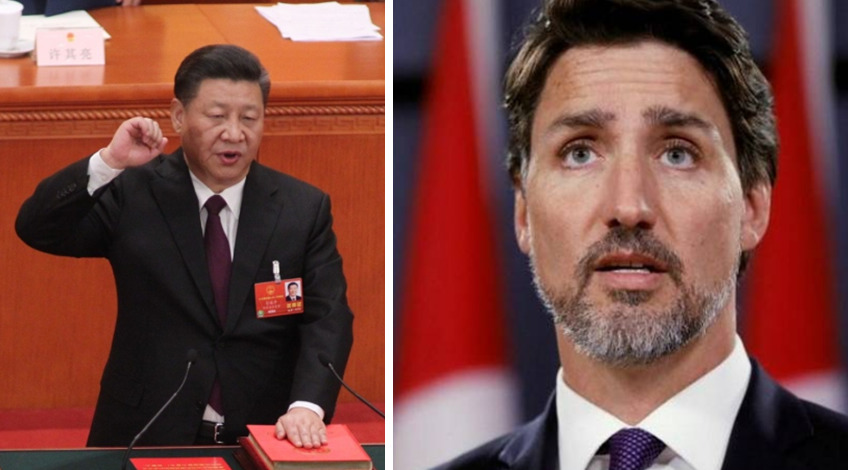As China continues to face allegations of covering up the severity of the Pandemic, along with suspicions of the Chinese virus originating from a Wuhan lab, Beijing’s relations with countries are taking a heavy toll. The latest addition to the list of countries involved in a bitter war of words with China is Canada. Ties between Ottawa and Beijing have been embittered in the recent past over the arrest of a Huawei senior executive Meng Wanzhou by Canada in December 2018, on an extradition request from the United States.
Huawei, a Chinese telecom giant, is an emotive issue for Beijing as it has been repeatedly trying to push its 5G technology in the West and other parts of the world despite countries rejecting it over security and privacy concerns.
The arrest of the Huawei senior executive had naturally kicked off bilateral tensions between Canada and China, which have only further aggravated during the ongoing Pandemic.
Initially, Beijing was trying to make inroads into Canada through its “mask diplomacy”, and forcing other countries, including Canada, into accepting Huawei as a trade-off for shipping medical equipment and protective gear that is in short supply in most of the countries around the world.
However, this “mask diplomacy” seems to have backfired disastrously for China, at least, in the case of Canada. Deteriorating Canada-China ties is the substandard medical equipment that Beijing shipped into Canada.
Recently, Canada’s public health authority revealed that around 1 million KN95 respirators acquired by Ottawa from China failed to meet the Federal COVID-19 standards for use by frontline health workers.
China became the source of 70 per cent of Canada’s medical supplies at a time when the rest of the world is battered with a virus that originated in a Chinese wet market/ laboratory in the first place.
But Beijing has literally backstabbed Canada at this critical juncture.
Canada Prime Minister Justin Trudeau recently revealed that two Canadian planes that were sent to China to pick up shipments were forced to return empty.
Trudeau also underscored the intricacies involved in importing Personal Protection Equipment (PPE) from China, at a time when the protective gear has become indispensable in fighting the novel Coronavirus.
China, on the other hand, sought to discredit Canada’s Prime Minister by describing his remarks as “inaccurate”, which led to a war of words between the two countries.
Canada’s Foreign Affairs Minister Francois-Philippe Champagne stressed that it was a matter of “fact” that two Candian planes were forced to return empty from China, apparently because Shanghai airport happens to be a very busy place these days.
China-Canada relations are in fact troubled on many fronts, and one of the bigger issues is the arbitrary detention of two Canadians- Michael Kovrig, a former diplomat, and Michael Spavor, a businessman, by Beijing since December 2018.
China has detained them on accusations of espionage, and the country is yet to frame formal charges against them despite more than 500 days of detention. What makes it worse is that China has started withholding consular access to the two Canadian citizens, citing Coronavirus lockdown of prisons.
Watch | #China stops consular access to Canadian duo accused of spying and stealing secrets
More details by @alysonle! pic.twitter.com/FzISxdhx50
— WION (@WIONews) April 25, 2020
The duo arrested apparently in the form of Chinese retaliation against the arrest of the Huawei executive has become another reason of a showdown between the two countries, and even Champagne has argued that China is obligated to allow consular access to the two Canadians in accordance with the Vienna Convention.
Beijing meanwhile continues to feel “offended” with everything that Canada does or says in line with China’s tenets of aggressive diplomacy.
Recently, Beijing lashed out at Canada over what the former described as Foreign Affairs Minister Champagne’s “irresponsible remarks”.
A statement from Canada’s Foreign Office stated that Canada supported the right to peaceful protests and that with 3,00,000 Canadians in Hong Kong, it also had a vested interest in the stability and prosperity of Hong Kong. But Beijing has accused Canada of “gross interference in Chinese affairs”.
China and Canada are thus set for a major conflict- the two countries share a mutual feeling of hostility and discord at all fronts from the arrest of the Huawei executive in Canada more than a year ago to denial of consular access to Canadian nationals, and supply of substandard Chinese medical equipment to Canadian cargo planes returning empty.
Ottawa has also shown deep interest in pro-democracy Hong Kong protests which Beijing, like any other issue, calls a gross interference in its “internal matters”. With the passage of time and deteriorating relations, Canada might want to show an interest in other disputes involving China as well. The two countries are thus poised for an escalation in tensions that could easily spiral out of control.
